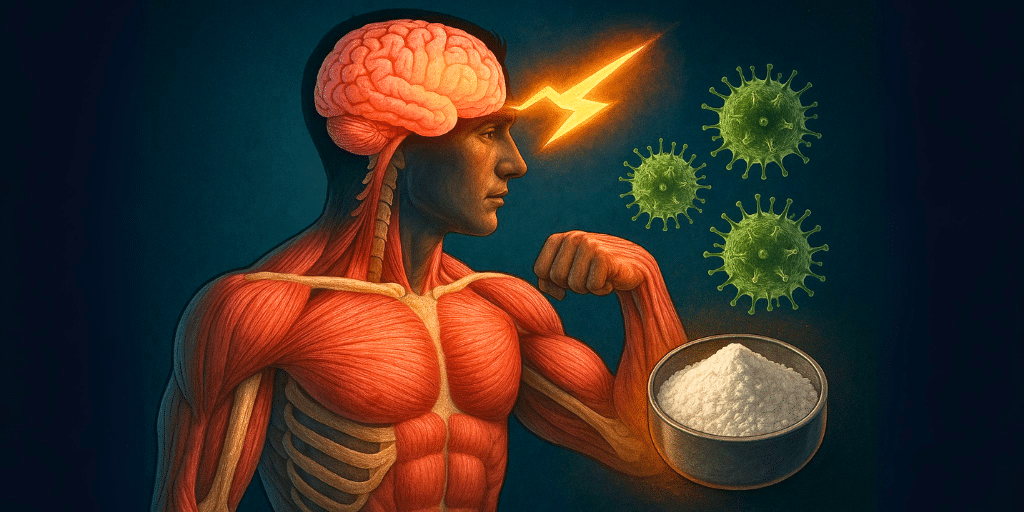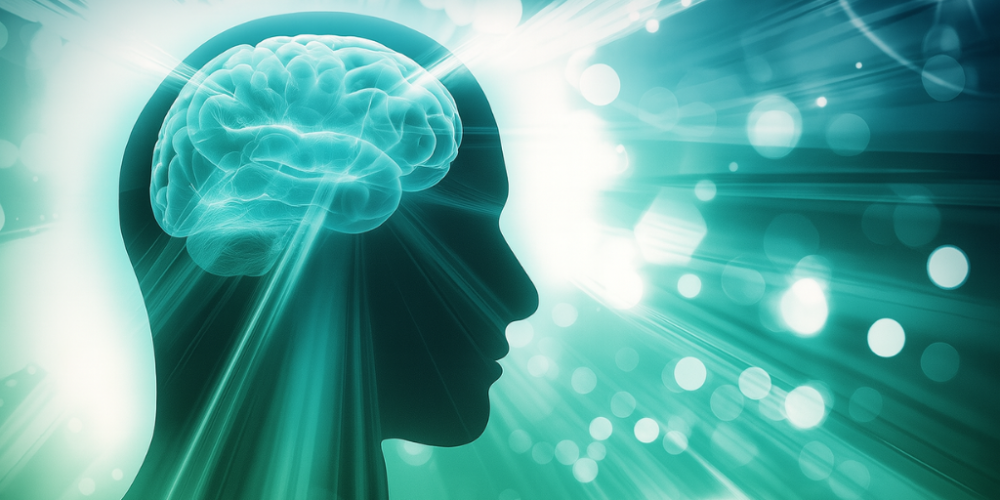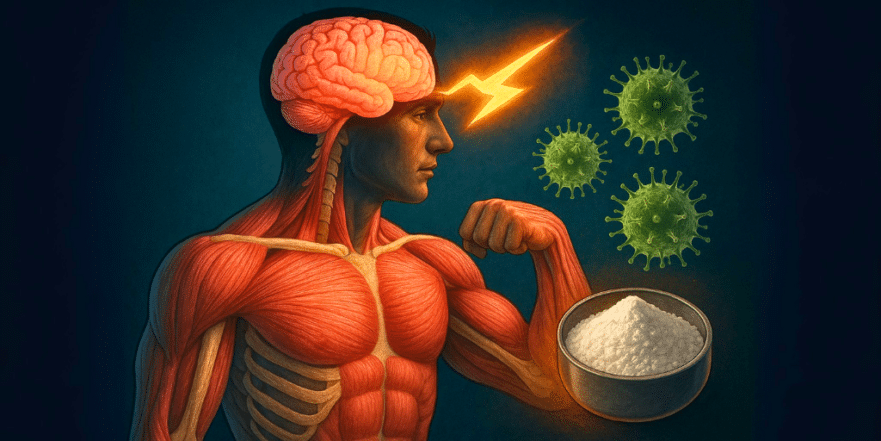
You’ve probably heard that creatine might cause kidney problems, but today, we’re going to clear that up and explore the many benefits this supplement offers for your overall health. Creatine is definitely not just for athletes. We’ll go beyond its basic function to discuss how it can help your brain, bone health, prevent muscle loss, improve body composition, and even protect against certain degenerative diseases. And stick around, because at the end, I’ll explain exactly how and when to take it, and finally put to rest the myth about kidney issues. (Based on the insights of Dr. Tiago.)
What Exactly Is Creatine?

Creatine is a substance naturally found in our bodies. Our bodies actually make it! We also get it from food. Creatine is produced from three amino acids: arginine, glycine, and methionine. You can find it mainly in animal products like meat, chicken, and fish.
So, what does creatine do? This is key to understanding all its benefits. Creatine plays a big role in regenerating a molecule called ATP. Don’t worry, I’ll explain what ATP is. ATP is the energy source for our cells. Think of it as our energy reserve. Whenever your body needs energy for a process, it breaks down ATP to release that energy.
Creatine helps regenerate ATP. This means creatine helps with our energy regeneration. That’s why supplementing with creatine can improve many aspects of your health, starting with what most people know: muscle gain.
Creatine and Muscle Growth

Why does creatine help with muscle gain? When you supplement with creatine, you give your muscle cells more energy. About 95% of creatine is stored in our muscles. When muscles have more energy, they have more strength and can achieve greater muscle mass. This is why athletes use it to build muscle.
But what if you’re not looking to get huge or build a lot of muscle? Why should you still consider creatine? Studies show that besides helping build muscle, creatine helps prevent muscle loss. This is known as sarcopenia, the loss of muscle that happens as people age, typically starting around 40 or 50. Sarcopenia reduces physical vigor, muscle strength, and worsens body composition. So, even if you’re not aiming for big muscles, supplementing with creatine can help you maintain good body composition. This is why studies are now focusing on its role in preventing sarcopenia.
This muscle loss is also linked to an increased risk of falls and immobility in older adults, which can lead to more health problems associated with aging and a lower quality of life. By supplementing with creatine, especially when combined with physical activity, you can help slow down this muscle loss.
Beyond Muscles: Brain Power and Bone Health

Did you know creatine can also help your brain? Remember how creatine aids in regenerating ATP, our energy source? While 95% is in the muscles, the other 5% is in the brain. Our brain is a major energy consumer. It makes up only 2% of our body weight but uses about 20-25% of our body’s energy. Studies show that creatine supplementation can improve cognitive performance in both adults and older individuals. This improvement is seen in better concentration and in tasks requiring significant cognitive effort.
Ever feel mentally drained after a long day of focused work? Creatine can help reduce that brain fatigue. By improving energy supply to your brain, it can help it feel less tired. Interestingly, studies indicate this benefit isn’t just for daily life; it also helps during periods of stress and sleep deprivation. So, if you had a bad night’s sleep, you might feel less tired if you’re taking creatine.
For older adults, studies suggest creatine supplementation can help prevent bone loss, like osteopenia and osteoporosis. It has even shown improvements in bone mineralization patterns. However, it’s important to remember that this bone health improvement is linked to physical activity and a good diet rich in protein and calcium. Creatine alone isn’t a magic bullet; you need to provide the building blocks for bone recovery through exercise. Bones and muscles are closely linked – we call it the osteomuscular system. If your muscles are growing stronger or you’re losing less muscle, your bones will remodel and improve their mineralization too.
So far, we’ve covered three benefits: improved body composition by reducing sarcopenia, better cognitive performance with less mental fatigue, and improved bone health by preventing osteopenia and osteoporosis.
Creatine and Disease Prevention
More recent studies are also looking at creatine’s role in preventing and treating neurodegenerative diseases, particularly muscular dystrophies. These conditions significantly impact quality of life, and studies suggest creatine supplementation can help patients gain strength.
Addressing the Kidney Myth

Now, let’s tackle the big question: kidney problems. Where did this idea come from? It stems from the fact that a primary marker for kidney function is a blood test measuring a substance called creatinine. It’s important to note: creatinine is not creatine.
Creatinine is a byproduct. When creatine is used by the body, it breaks down into creatinine. Think of it like this: Imagine a park with trees and a cleaning crew. The number of leaves on the ground is like creatinine, and the trees are like creatine. The cleaning crew is like your kidneys.
In a normal park, there are always some leaves (creatinine) from the trees (creatine). If more trees are planted (you take more creatine), there will naturally be more leaves on the ground (higher creatinine). But the cleaning crew (kidneys) is still working just as effectively. The park is still clean. The kidneys are functioning normally, even though the ‘leaf count’ (creatinine level) is higher.
So, when people taking creatine have a higher creatinine level in their blood, it might look like their kidneys aren’t working well because the marker has gone up. However, other markers, like cystatin C, show that the kidneys are functioning perfectly fine. Numerous studies confirm that creatine use does not harm kidney function or cause kidney stones.
How to Take Creatine
How much creatine should you take? The most common approach is 3 to 5 grams every day. Some people suggest a ‘loading phase’ at the beginning, taking 10 to 20 grams per day for a week to quickly saturate the body with creatine, then dropping to the maintenance dose of 3 to 5 grams daily. However, for most people, simply taking 3 to 5 grams daily works well and is safe.
What’s the best time to take it? Taking creatine close to your workout, either just before or just after, seems to improve its absorption. While this is still debated a bit, studies tend to support taking it around exercise time. So, if you’re starting, try taking it near your workouts.
It’s also helpful to consume creatine with carbohydrates or protein, as this aids absorption. A practical tip is to mix it into a banana smoothie. One more thing: caffeine might reduce creatine absorption. So, try not to consume coffee right before or around the time you take your creatine, especially if you’re using pre-workout supplements that contain caffeine.
Source: Dr. Tiago

